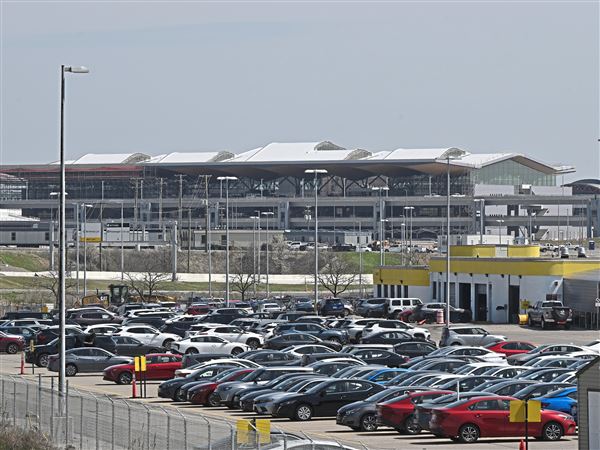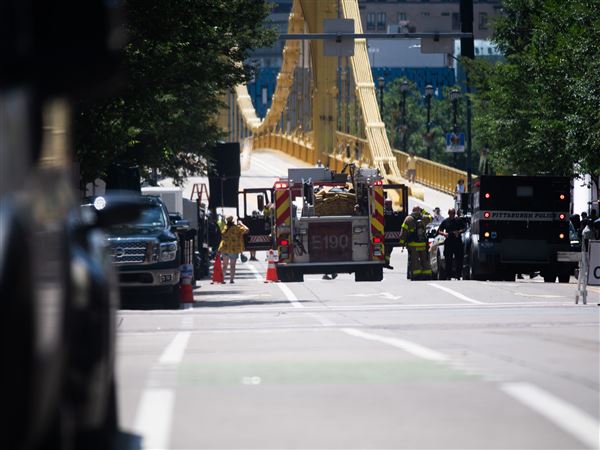We'd be foolish not to proceed with the T extension
Today the Port Authority board is scheduled to vote on whether to accept bids for the construction of the North Shore Connector.
This is an imaginative project that remains beyond the appreciation of many Pittsburghers. Unfortunately, it continues to be the target of inaccurate, shoot-from-the-hip criticisms.
In this regard, a few truths need to be told:
 Should this project be canceled, the funds intended for its construction will be spent in other cities for other projects, and not in Pittsburgh.
Should this project be canceled, the funds intended for its construction will be spent in other cities for other projects, and not in Pittsburgh.
 You can't reach the neighborhoods of the North Side and beyond without first constructing the most expensive part -- the river crossing. Without it, the light-rail system will never go to the North Side or any northern suburb.
You can't reach the neighborhoods of the North Side and beyond without first constructing the most expensive part -- the river crossing. Without it, the light-rail system will never go to the North Side or any northern suburb.
 It is often implied that the cost overruns associated with this project are a result of bungling by the Port Authority. In fact, the Hot Metal Bridge and the Mon-Fayette Expressway projects, both proposed by other public agencies, are also threatened by the severe inflation plaguing the construction industry.
It is often implied that the cost overruns associated with this project are a result of bungling by the Port Authority. In fact, the Hot Metal Bridge and the Mon-Fayette Expressway projects, both proposed by other public agencies, are also threatened by the severe inflation plaguing the construction industry.
 The Port Authority has done a superb job of leveraging federal and state funds for this project. What other local agency has ever obtained more than $400 million for a local investment of just $14 million? This project is practically a giveaway.
The Port Authority has done a superb job of leveraging federal and state funds for this project. What other local agency has ever obtained more than $400 million for a local investment of just $14 million? This project is practically a giveaway.
I urge all members of the Port Authority board to vote to accept the bids for this project. To walk away from roughly $420 million of federal and state funds is not only foolish, it is utterly irresponsible.
NEAL A. SCHORR
Marshall
Not a priority
OK, $435 million for a light-rail connector under the river ... that's a priority? Route 51 into the South Hills is a priority. The Mon-Fayette Expressway from the South Hills into Downtown, Oakland and the airport is a priority.
Can we please get our priorities straight in this county? Seems the money is never available for what's needed because it's spent in such ridiculous ways.
Also, before we start boring under our bridges, can we fix the bridges first? Unbelievable.
ANN CIPRIANI
Jefferson Hills
Wage absurdity
I get a kick out of Sen. Rick Santorum's TV campaign ad in which he says his father and grandfather came to America and his grandfather worked for 30 years in the coal mines.
If it were not for John L. Lewis and the United Mine Workers, the coal miners of today would be working for the pennies a day that Grandpa Santorum was paid.
Members of the Senate, like Mr. Santorum, would vote against any pay increase for them, just like he voted not to increase the minimum wage for workers today. Low-paid workers receive only $5.15 per hour, a federal rate that has not changed since Sept. 1, l997.
In that period, according to Sen. Ted Kennedy, the senators received $31,000 per year increases. An increase in the minimum wage would not impact the federal budget one penny, but Sen. Santorum's pay increase did.
WM. REGIS O'MALLEY
Whitehall
A hoopless summer
The city needs to have more opportunities for teens to go out and play in their own neighborhoods. Where I live, Swisshelm Park, our parklet was refurbished a few years ago with mostly younger children in mind.
Eventually, it was decided to take down the basketball hoop because it unfortunately brought nonresidents and others whose language was not considerate around children.
I am 15 and would like to have a place where I can go play basketball during the summer because I don't want to sit around all day. Every time I walk past the parklet I see the younger kids running around and having a fun time.
Even though the older kids weren't setting a prime example, they always let me play in their games. The rusted pole and backboard make the park look worse than it did before it was renewed, and the empty lot where the court used to be is terrible.
The basketball court let everyone come together and play, but I guess our community doesn't think that bonding between different people is a good thing. This park forgets all about the older kids.
I just don't see how someone can come in and take out the one thing that brings everyone in the community together. Everyone would be happier with a hoop.
JOE BARBISH
Swisshelm Park
Decisions like this have led to the corruption of the political process
Regarding the July 3 "As Others See It" ("Clear Thinking on Money in Politics" from the Los Angeles Times) praising a recent Supreme Court decision that struck down a Vermont campaign finance law that would have limited campaign contributions and expenditures: This ruling, affirming the 1976 Buckley decision that equates campaign money with political speech, deserves no praise.
Buckley, the foundation of our corrupt campaign finance system, turned bribes into free speech, an act of constitutional alchemy that must have the Founding Fathers turning in their graves. One need only look to the Constitution to see the Founding Fathers' stance on corruption. They named only two crimes specifically that warranted impeachment: treason and bribery. The real shame is the legal bribery and corruption.
Our campaign finance system, backed by the Buckley decision, is a maze of loopholes designed to allow as much money as possible to flow from the special interests to our elected officials.
The First Amendment gives us the right to speak freely about the issues of the day without any government interference. Limits on campaign contributions and expenditures do not infringe on this right.
Supporters of Buckley argue that if limits are too low, candidates will be unable to get their message out. This argument is specious, at best. The bulk of campaign money funds TV ads that are misleading if not outright deceptive. We can do without them.
If candidates want TV time, they can hold debates. Free and open debate -- that's what the Founding Fathers envisioned when they wrote the First Amendment.
MIKE DeCECCO
Crafton
This effective missile defense technology will only improve
Your July 10 editorial "Indefensible: The U.S. Anti-Missile System Is Risky Business" is itself indefensible. To flatly say that the United States doesn't need a system to defend itself against a long-range missile attack, based on the fact that the first launch of a North Korean missile failed, is nonsensical. North Korea will continue to invest huge sums of money -- while its people starve -- to build a missile that works, and could someday deliver a nuclear weapon to an American city, including Pittsburgh.
Also, North Korea has been selling missile technology for years and will continue to do so. The editorial's assertion that the U.S. missile defense system doesn't work is also nonsensical: We have successfully intercepted five target warheads in space -- targets traveling more than 15,000 mph -- using only the force of a direct collision between the interceptor and the warhead to pulverize the target. In 2001 and 2002, we did it four times in a row, and the technology gleaned from these successful intercepts forms the bulk of what is deployed today in Alaska and California. With a new round of very realistic testing scheduled to begin late this summer, the technology will only get better over time.
But the bottom line is this: We have, for the first time since the beginning of the nuclear age, a system to provide a defense against a limited attack directed against any of our 50 states. Not to deploy a system -- even a limited one -- in the face of what is now a very apparent threat would be totally irresponsible and would also run contrary to the law -- the National Missile Defense Act of 1999, passed by a vote of 98-0 in the U.S. Senate and signed into law by President Clinton. The law states simply that the Defense Department must deploy a system to defend all 50 states as soon as technologically possible. Since it is "technologically possible" that is exactly what we have done.
One additional issue: the Post-Gazette, following the lead of many newspapers in the country, does a disservice to its readers by stating matter of factly that the long-range missile defense system will cost nearly $60 billion over the next six years. Even a cursory examination of congressional budget documents will show that less than one-third of this amount -- about $16 billion -- will be spent on the long-range missile defense system. The majority of the funding -- and this has been the case for many years -- will be spent on missile defenses to defeat short- to intermediate-range missiles of the type that threaten our deployed forces overseas and our allies and friends. A note here: the Government Accountability Office, in its analysis of the costs associated with the Sept. 11, 2001, terrorist attack in New York City, said the cost of the attack on the World Trade Center was about $89 billion. This was an attack not involving weapons of mass destruction. Imagine the cost if it had been such an attack.
RICK LEHNER
Director of Communications
U.S. Missile Defense Agency
Washington, D.C.
First Published: July 13, 2006, 4:00 a.m.
















